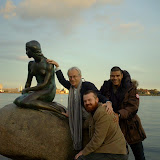
Lewis/Stalnaker semantics has it that all counterpossibles are vacuously true. Non-vacuism, by contrast, says that the truth-values of counterpossibles are affected by the truth-values of the consequents. Williamson, in his Hempel Lectures, objects to non-vacuism. He asks us to consider someone who answered `11' to `What is 5 + 7?' but who mistakenly believes that he answered `13'. For the non-vacuist, (1) is false, (2) true:
(1) If 5 + 7 were 13, x would have got that sum right
(2) If 5 + 7 were 13, x would have got that sum wrong
Williamson is not persuaded by the initial intuitiveness of such examples:
... they tend to fall apart when thought through. For example, if 5 + 7 were 13 then 5 + 6 would be 12, and so (by another eleven steps) 0 would be 1, so if the number of right answers I gave were 0, the number of right answers I gave would be 1. (Lecture 3)
That's the whole argument. It isn't initially clear what the full argument is, but Brogaard and I commented on our abbreviated version of it in "Why Counterpossibles are Non-Trivial" (
The Reasoner v.1,
no. 1).
Alan Baker's critique (
The Reasoner v.1,
no. 2) of our paper has prompted us to say more. Here's what we think.
Williamson's conclusion is this:
(3) If the number of right answers I gave were 0, then the number of right answers I gave would be 1.
The implicit reductio must be this: If (3) is true, then (1) and (2) are true --- contrary to what the non-vacuist supposes. For if I gave 0 right answers (in close worlds where 0=1), then I also gave 1 right answer (in those worlds). Hence, I got the sum right and wrong (in those worlds).
Williamson's abbreviated eleven-plus-one steps must be these:
(i) If 5 + 7 were 13, then 5 + 6 would be 12
(ii) If 5 + 7 were 13, then 5 + 5 would be 11
...
(xi) If 5 + 7 were 13, then 5 + -4 would be 2.
(xii) If 5 + 7 were 13, then 5 + -5 would be 1.
Getting to (3) from here, however, is trickier than Williamson supposes. The argument must be that any world where 5 + -5 = 1 is one where 0 = 1, substituting `0' for `5 + -5'. Hence,
(xiii) If 5+7 were 13 then 0 would be 1.
Therefore, if 5+7 were 13 (and I gave 0 right answers), then (since 0 would be 1) the number of right answers I gave would be 1.
The argument is unsuccessful. First, substituting `0' for `5+5' is illicit, since as Williamson himself notes the non-vacuous counterfactual is hyperintensional. Hyperintensional operators do not permit substitutions of co-referring terms
salva veritate.
Incidentally, Williamson takes the hyperintensionality to be a mark against non-vacuism, because substitution is valid in more ordinary counterfactual contexts. However, we need not throw out the baby with the logically ill-behaved bath water. This sort of substitution preserves truth at every world on every
standard model. Only the counterpossible context (i.e., the counterfactual context whose accessibility relation invokes impossible worlds) are hyperintensional. Our logical principles can be restricted accordingly.
A second problem for Williamson emerges in steps (i) through (xiii). These conclusions hold, if the game is to evaluate the consequent of each at
deductively closed worlds where 5+7 = 13. But if there are non-trivial counterpossibles, the relevant worlds of evaluation must not be deductively closed---lest they collapse into the trivial world where everything is true.
Once we deny deductive closure, Williamson's reasoning fails. Let the following world, (W), be non-deductively closed:
(W) {5 + 7 = 13, the number of right answers I gave wasn't 1, the number of right answers I gave was 0, ... }
In contexts where W-worlds are closest, (2) is true and (1) false, as the non-vacuist predicts. For Williamson's argument to succeed, the relevant impossible worlds in which I gave 0 right answers
and 1 right answer must always be closer than the relevant impossible W-worlds. This hasn't been shown. Indeed, (W) is closer to the actual world than Williamson's envisaged impossible worlds, since (W) is constituted by fewer explicit contradictions.
UPDATE: changed 'explicit' to 'implicit'





















 , is false. But in ordinary conversational contexts, the apparently bizarre {A, not-B} possibilities are irrelevant and remote. Hence, the might-claim,
, is false. But in ordinary conversational contexts, the apparently bizarre {A, not-B} possibilities are irrelevant and remote. Hence, the might-claim, 










 Photo by: Kristian Linnemann
Photo by: Kristian Linnemann Photo by: Kristian Linnemann
Photo by: Kristian Linnemann


 Left: (Danish embassy in Budapest, March 2)
Left: (Danish embassy in Budapest, March 2)


 (¬A □→ ⊥)
(¬A □→ ⊥) A
A  (A □→ B)
(A □→ B)